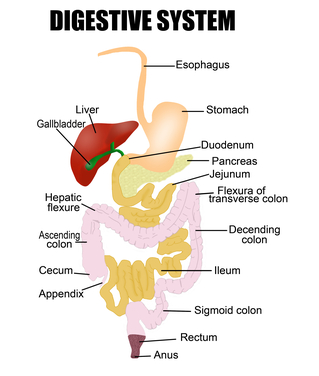Digestion 101
A healthy digestive system is something that many of us are lucky enough to be able to take for granted, but when the digestive system does get out of step, the entire body can feel its effects.

Busy lifestyles can have a negative impact on digestion. And if sluggish digestion becomes a chronic problem, a whole host of issues – both emotional and physical - can ensue. But there is some good news. Having a good grasp of the digestive basics, choosing gut-friendly foods and adopting better eating habits can go a long way towards boosting digestive health.
Digestion begins long before food hits our stomachs. In fact, it even begins before food hits our mouths. Because the taste, texture, smell and appearance of food can affect the way our bodies absorb its nutrients.
As we prepare to take our first mouthful, our brain sends signals to our digestive tract. Our mouth "waters" and - by secreting gastric juices - our stomachs do, too, and digestive enzymes are released in the small intestine. And that’s before our teeth and tongues start working together – grinding and mixing the food - to make it easier to swallow.
A whistle-stop tour of the digestive system
 The esophagus: After chewing and swallowing, food enters the esophagus, a ten-inch tube that connects the throat to the stomach. A process called peristalsis – muscular contraction and relaxation – transports the food towards the lower esophagal sphincter, a valve that is usually closed but opens to let food into the stomach.
The esophagus: After chewing and swallowing, food enters the esophagus, a ten-inch tube that connects the throat to the stomach. A process called peristalsis – muscular contraction and relaxation – transports the food towards the lower esophagal sphincter, a valve that is usually closed but opens to let food into the stomach.
The stomach: Although the stomach can hold an impressive gallon of food and liquid, there is an upper limit when it comes to abdominal comfort. So it’s important not to overeat. Acting like a blender, the stomach breaks food into smaller pieces adding digestive juices for easier absorption. Full emptying of the stomach – through the pyloric valve at the duodenum, the top of the small intestine – takes between two and four hours, depending on the richness of the meal.
The small intestine: The small intestine (also known as the ileum) is where food items are broken down into their component parts by digestive enzymes secreted from the pancreas. Protein, carbohydrates and fat are then broken down further into very small parts. These particles are absorbed into the blood stream and into the liver where they are used for various bodily functions. Water, vitamins and minerals are also absorbed here. Digestion occurs slowly in the small intestine and can take up to three hours.
The large intestine: Also called the colon, the large intestine is the body’s waste removal system. The remaining components of digestion - like water and fibre - that have not been used by the body, enter the colon through the ileocecal valve. Water is removed, through absorption, and everything else moves through the colon, for elimination, in a process taking between twelve and twenty-four hours.
 Digestion is a complex chemical and physical process, that can take up to 30 hours. But we can assist the process by adopting healthy lifestyle habits.
Digestion is a complex chemical and physical process, that can take up to 30 hours. But we can assist the process by adopting healthy lifestyle habits. Here are some quick tips to improve digestion:
- Try to be mindful while you’re eating – sit up at the table, ditch the technology, relax and enjoy your food.
- Take small bites and chew each mouthful well.
- Eat slowly. That way, you’re more likely to stop eating before you get too full.
- Avoid ice-cold drinks while eating because they can contribute to a sluggish digestion.
- Snack regularly, getting too hungry could cause you to overeat at mealtimes, and snack wisely. High fibre snack foods - with just a little protein and fat – can help to regulate blood sugar levels.
- Try eating prunes and drinking prune juice daily as a source of fibre and sorbitol.
- Find ways to relax – by listening to soothing music or doing some gentle exercise, like yoga – to help avoid digestive problems.





